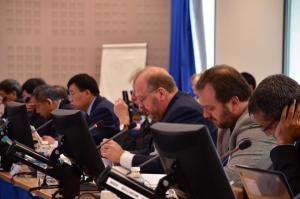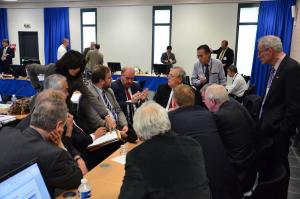The next six months will be crucial
25 May 2012
-
Hervé Pero, European Commission
"Corrective actions on the schedule slippages, as they were proposed by the management of the ITER Organization during this week's Management Advisory Committee (MAC), show the right approach," says Hervé Pero, Head of the European delegation to MAC.
There are good reasons why the European Union supports, and will continue to support, ITER.
ITER is a major international project. It opens long-term scientific, technological and industrial opportunities, and it is in line with the European energy policy defined in the Energy Roadmap 2050 that calls for a low-carbon, competitive economy by 2050 and a 60 percent reduction of CO2 emissions in the power sector by 2030.
Due to the many challenges of fusion energy—just look at the size of the investment in ITER—this is a project that could only be attempted at an international level.
After the end of an offical MAC session, the chairs are moved closely together for a more informal discussion.
However, let's always remember that fusion technology remains in competition with other technological approaches for energy generation. We therefore need to implement and stop losing time. We must bear in mind that we have been entrusted with public funds, which gives us an enormous responsibility towards the citizens within the ITER Members.
Since the European Union has agreed to earmark funds for ITER through 2020 at the level of EUR 6.6 billion (of which EUR 2.3 billion is for 2012-2013), we have concerns regarding the schedule slippages that have occurred over the past several months. Slippages do not contribute to the positive image of the project; they also risk undermining the political support for ITER if they are not corrected soon. The next six months will therefore be crucial.
Corrective actions on the schedule slippages, as they were proposed by the management of the ITER Organization during this week's meeting of the Management Advisory Committee (MAC), show the right approach. There is a consensus among all ITER Members on the need to preserve the momentum of the project. It is also crucial to soon complete the design of the vacuum vessel and also to deliver the final set of design data for the conclusion of the Tokamak Complex construction contract.
The European Union will, along with the MAC, closely monitor the implementation of all actions during the next weeks, which are critical in order to confirm the success of the proposed recovery plan.
Hervé Pero is acting Director of Energy within the Directorate General for Research at the European Commission.



